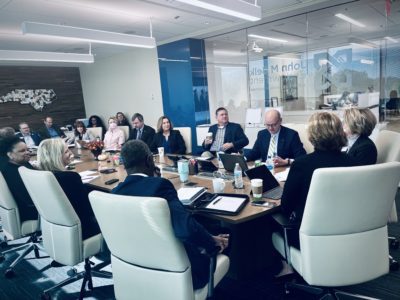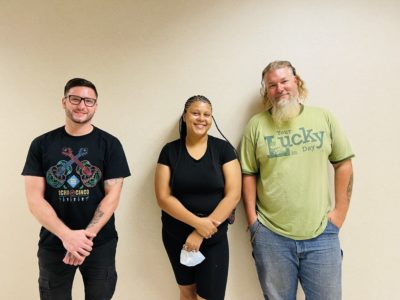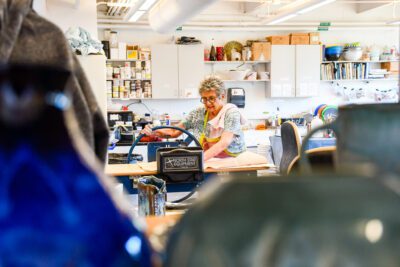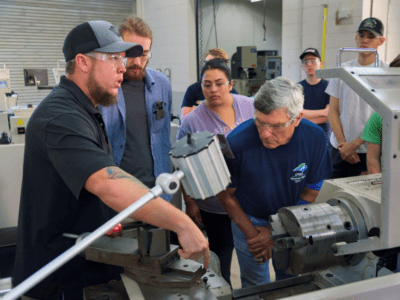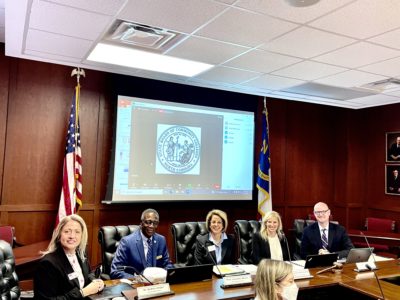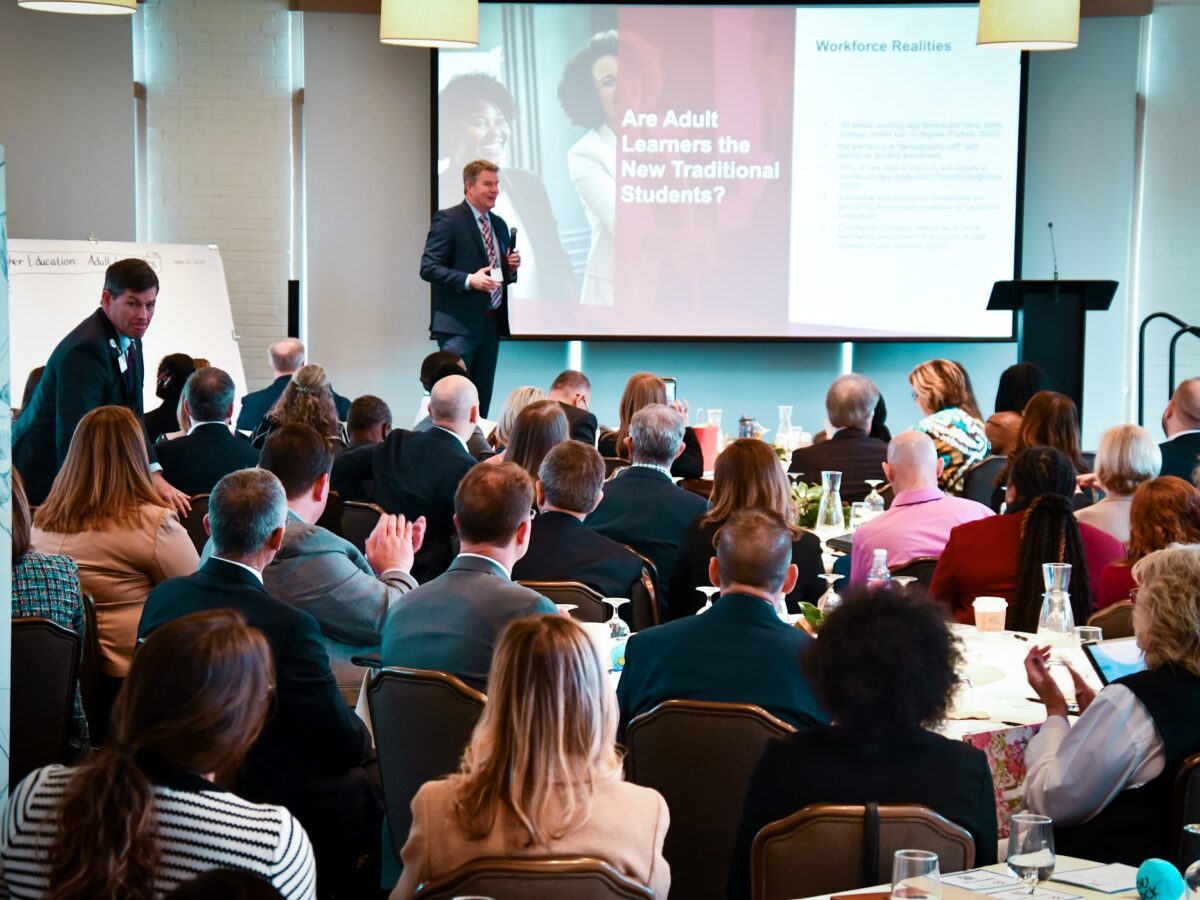

Share this story
- Thirty-nine million working-age Americans have some college credits but no degree, Dr. Matt Bergman told convening attendees. At the same time, 65% of new jobs in the U.S. require a postsecondary credential.
- "Why don't we take an appreciative inquiry mindset and look at where these people have been, what they have done, and celebrate the success that they've had so far and build on that?"
|
|
What makes adult learners persist?
Despite many barriers, adult learners primarily persist to increase their earning power or workplace advancement and for personal fulfillment, according to Dr. Matt Bergman, a University of Louisville professor of educational leadership and co-author of “Unfinished Business: Compelling Stories of Adult Student Persistence.”
“I found these humans that truly are doing yeoman’s work, in spite of all these competing responsibilities, to try and change generations of their families,” Bergman told North Carolina community college leaders at an adult learner convening last week, regarding his research.
With the enrollment challenges facing higher education, adult learners represent one of the largest population segments for community colleges to reach. For that reason, community colleges need to understand why these students persist and how to serve them.
“That’s why we’re here today – to engage these people and change the trajectory of their lives,” he said. “And for generations to come.”
Last week, representatives from 52 of state’s 58 community colleges joined state leaders and education experts to discuss best practices for engaging adult learners. Bergman, who gave one of the event’s presentations, offered insight into national trends regarding adult learners.
Thirty-nine million working-age Americans have some college credits but no degree, Bergman said. At the same time, 65% of new jobs in the U.S. require a postsecondary credential, according to a 2020 study on job growth and education by Georgetown University.
In recent years, the N.C. Community College System (NCCCS) has increased efforts to engage adult learners, or students older than 25. Since launching two adult learner pilot programs, the number of adult learners enrolled in N.C. community colleges increased by 10%, according to a new report.
During his presentation, Bergman spoke about the challenges adult learners face, why they persist, and how colleges should adapt to meet adult student needs.
“It’s important to recognize the challenges that we face but also it is truly essential to take an appreciative inquiry mindset in to our work,” Bergman told attendees. “Because there are so many magical things going on at your campuses that inspire me… I am so darn impressed with the work that you’re doing here.”
What challenges do adult learners face?
Many community college students – some of them adult learners, low income, and/or first-generation college-goers – experience various barriers that can make academic success more difficult.
For adult learners, Bergman said challenges also include competing responsibilities, a negative previous college experience, and a sincere belief that they don’t fit in.
More than half of NCCCS students are 25 or older, according to 2021-22 headcount data. However, community colleges policies and practices aren’t always designed with adult learners in mind, Bergman said.
Sometimes, that looks like a lack of evening classes, or strict attendance policies that don’t account for child care needs or family responsibilities.
“Education is absolutely a priority to these students, but it’s not the only priority,” Central Carolina Community College President Dr. Lisa Chapman said in a video shown at last week’s convening.
And students with unmet basic needs are the most likely to not persist, Bergman said, emphasizing the importance of wraparound resources for students.
Additionally, some students struggle to justify the sacrifices they’d have to make to fit school into their lives. In turn, a lack of instant gratification can lead students to a “short-term mindset,” Bergman said, where it doesn’t seem worth it to leave a decent job for uncertain opportunities.
“You have to get into the mindset of these individuals that believe that time scary time scarcity is the reality of their lives,” Bergman said. “If a competing responsibility is viewed as more relevant, they’re out. So we have to engage these people.”
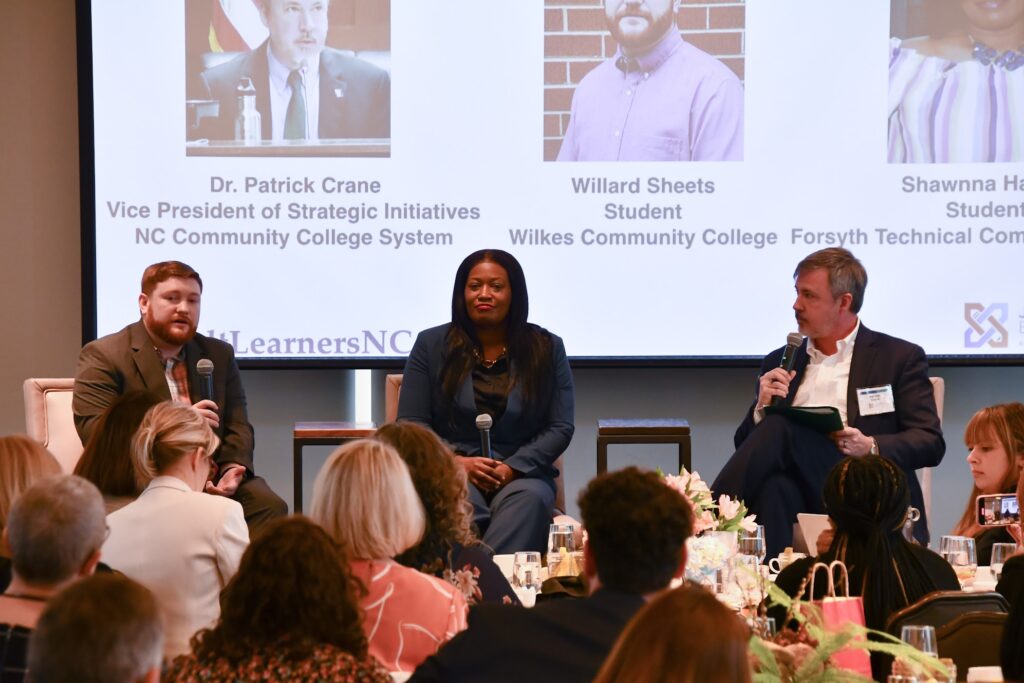

Why do adult learners persist?
With all the challenges adult students face in mind, colleges must take time to appreciate their prior successes, Bergman said.
“It’s not all doom and gloom,” he said. “Why don’t we take an appreciative inquiry mindset and look at where these people have been, what they have done, and celebrate the success that they’ve had so far and build on that?”
In addition to returning to school for personal fulfillment or to increase their earning power and workforce advancement, Bergman identified several other motivations:
- To develop skills to stay competitive
- To improve employment opportunities
- To prepare for a career change
- To inspire children by setting the example
College marketing shouldn’t just focus on job advancement and income, Bergman said, because “it’s neck-and-neck in the literature” with personal fulfillment.
Colleges must also magnify compelling stories of adult learner persistence, the topic of Bergman’s 2019 book.
For community colleges in particular, such stories are important. These stories sustain the work, he said, which often lacks large endowments and often receive less funding than at four-year institutions.
“We have to see the value in our work – the compelling stories of the people that we serve,” Bergman said.
While adult learners do face many barriers, Bergman said it’s an “easy cop out” to use challenges to justify low engagement with such students.
Bergman proposed viewing adult learners instead as “OLLs,” or older, liberated learners.
The “real” story of “OLL” students, per Bergman, is that they’re high-performing working adults, with strong family backgrounds/supports, and large networks. Adult learners are also often highly motivated, self-efficacious/self-directed, achievement oriented, and more independent.
“If we live in a deficit mindset, we cannot serve these people,” he said.
What can community colleges do?
During Bergman’s research, he found that for each further step toward an education goal, students were 1.5 times more likely to persist. In other words, students originally taking one class were more likely to persist when they decided to seek a credential. Students initially seeking credentials were more likely to do so when they sought a certificate or degree, and so on.
That finding, Bergman said, demonstrates the need for colleges to streamline pathways and help students understand how credentials and degrees can stack.
Active, relevant learning is another key element in producing higher levels of graduation, Bergman said.
“We have to connect to these human beings at a deeper, more intentional level to connect them to content that has value and meaning for their lives in their entirety,” he said. “I know so many of you are already doing that.”
Colleges should also offer prior learning assessments (PLA) to incoming students. These assessments gives students opportunities to earn credit or demonstrate proficiency for past education, hobbies/interests, and work/training and volunteering.
Not only do such assessments increase graduation rates and the pace to graduation, Bergman said, they also increase student engagement. PLA is generally awarded for non-major credit, he said.
Students with access to PLA also end up taking more credits on average, Bergman said, suggesting colleges shouldn’t worry about a loss of revenue with PLA.
What else can community colleges do? Bergman made several other suggestions:
- Reframe language with former students. Change, “We will give you another chance,” to “Will you give us another chance?”
- Continue to implement flexible, convenient pathways.
- Invest in an institutional culture that respects, values, and listens to adult learners.
- Efforts must be driven by “the noble purpose” of meeting students where they are, and avoid “quick fixes, gimmicks, or magic bullets”
For N.C. community colleges, Bergman encouraged leaders to continue thinking about flexible pathways, compressed opportunities, and lower costs for students.
Colleges should also focus on offering more hybrid and online instruction and effective coaching for students, while building professional trust with external partners.
“I know everyone in this room is truly committed to this work, but we get beaten down so often by the challenges of this work,” Bergman said. “We have to commit to the noble purpose of the work… and we have to acknowledge and value the joy that these people bring to our institutions.”
Editor’s note: The John M. Belk Endowment supports the work of EducationNC, and sponsored the convening with EdNC.



